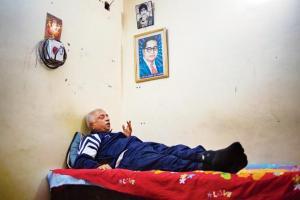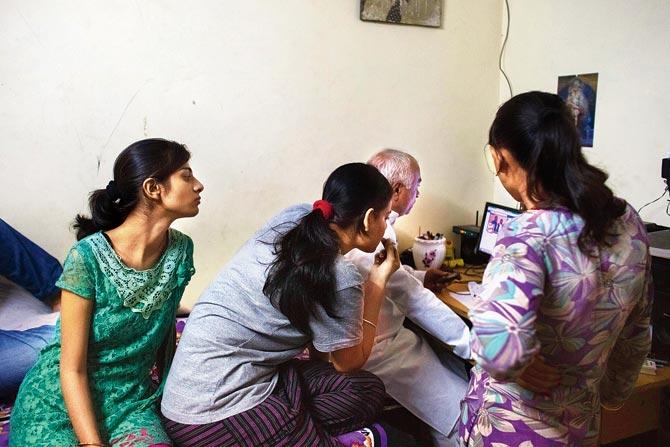A week away from celebrating their 10th anniversary, the founder of a group that protects love against viscous detractors, looks back on his unusual journey

Sachdev is the founder of the NGO. PIC/AFP
"The woods are lovely, dark and deep. But I have promises to keep. And miles to go before I sleep. And miles to go before I sleep," Sanjoy Sachdev narrates from his favourite poem dated 1923 by Robert Frost. The lines, says Sachdev, 61, from Stopping by Woods on a Snowy Evening, are the foundation of Love Commandos, a group he set up in 2010. "I and the volunteers have vowed to rest the day our national helpline number stops ringing. Until then, we will continue to rescue star-crossed lovers across India."
ADVERTISEMENT
Sachdev is chairman of a group with a unique mission—to assist couples facing resistance, by helping them fight harassment, sheltering and providing them with legal assistance. While at his maternal uncle, Babusing Chauhan's behest, Sachdev became a full-time journalist, the job exposed him to social challenges people grappled with, and on more occasions than one, he and his friends had helped couples facing resistance from family. But, on July 3, 2010, Sachdev and his friend Sonu Rangi were called by a man, who claimed his son was falsely accused of rape. A document check revealed the girl's statement to the police, which confirmed the relationship was consensual. "They wanted to get married, but the girl's father had falsely implicated the boy. We helped him get bail. Today, the couple is happily married with two kids," Sachdev recalls.
Four days later, the group was formed and they decided to start a national helpline number. Deep seated patriarchy and caste discrimination meant that harassed couples began calling in from day one. Some had received threats, others wanted to elope, few others were seeking legal aid.
By 2012, the Delhi-based outfit tasted national fame when Aamir Khan decided to feature them on his television show, Satyamev Jayate. "Our popularity shot up and we began receiving calls from everywhere," he says, gradually expanding their work to 15 states—Kerala, Tamil Nadu, Andhra Pradesh, Telangana, Karnataka, Maharashtra, Assam, Meghalaya, Jammu and Kashmir, Punjab, Haryana, Rajasthan, Uttar Pradesh, Madhya Pradesh and Bihar.
Ten years since they launched, they say they have close to one lakh volunteers and over 500 makeshift centres, where couples can seek temporary refuge. But it hasn't been a journey free of pain. Sachdev speaks of the death of Abdul Hakim, 29, who along with Mehwish, 25, had eloped from Adoli, a village in UP's Bulandshahr district. Their first daughter was born at Sachdev's Delhi shelter. Despite warnings, Hakim decided to return to his village since he was homesick, and was shot dead. The casual labourer belonged to a poor Faqir family, while Mehwish was from the Jhojha community. "Minister of State for Home RPN Singh demanded a probe and deemed this incident as honour killing. But the UP police ruled out the angle. Some accused were arrested, some went scot-free. We lost Hakim but his wife and daughters are under our care," Sachdev shares.

Young girls, who left their homes to marry against family consent, with Sanjoy Sachdev at a shelter in Delhi
The law hasn't always been in their favour, he laments. It was only in 2015 that Sachdev says the first FIR was registered where honour killing was mentioned in the records. This was in Rajasthan's Bharatpur. Pratibha Gujjar, 22, was reportedly electrocuted at her parents' home. Her husband, Devasheesh Meena, 23, accused her family of killing her after they found that the two had secretly married in a Delhi court that same year. Before the murder, Gujjar had asked her husband to seek help from Love Commandos. "We were successful in getting the FIR registered," says a proud Sachdev, who adds that international press started taking up his cause. In fact, Swedish fashion brand Björn Borg launched the campaign site Unitethelovers.com, raising enough funds for resources to provide 52,000 hours of shelter for couples on the run . Photographer Max Pinckers featured Love Commandos and eloped couples in his photobook, Will They Sing Like Raindrops or Leave Me Thirsty. The book won the Photographic Museum of Humanity grant. British filmmaker Miriam Lyons filmed the organisation's work on and off over five years. In 2016, she was ready with a 52-minute documentary titled, The Love Commandos, and said she was in admiration of their work.
But the group's heydays lasted till January 2019. Sachdev's unexpected arrest that month made the Delhi police ask, is he a fraud? "I was arrested for confining a couple and extorting money from them. It was untrue. The couple reportedly went to the Delhi Commission for Women (DCW) and filed an FIR against me. But I am certain they had nothing to do with this. This is a larger conspiracy against the group. We receive regular threats, but this was a big setback." Interestingly, Sachdev argues, the DCW used to send distressed couples to his group for help. "I am certain I will be proven innocent. Hundreds of couples we helped came forward to offer their statements and support in court. This is my reward."
Sachdev clarifies that the group provides couples a roof and pays for their groceries and electricity bills. They are not expected to finance marriage registration and legal aid, but they do make exceptions for the underprivileged. "Despite the unfortunate incident, our phone still rings. People believe in us."
As Love Commandos completes 10 years on July 7, Sachdev believes there is a "love revolution" that's only getting started in the country. "Once this volcano explodes, many [detractors] are going to be wiped out. Love is a product of nature. Nobody has the right to deny young couples this emotion."
Honour killings in India
An honour or shame killing is the murder of a member of a family, due to the perpetrators' belief that the victim has brought shame or dishonour upon the family. In 2015, the National Crime Records Bureau (NCRB) data reveals 251 honour killings were reported in India. However, activists consider this number to be underestimated due to the misreporting of killings under general murders. According to the survey done by AIDWA, over 30 per cent of the total honour killings in the country take place in western Uttar Pradesh. There is no separate law in India for honour killings. But in August 2019, the Rajasthan Assembly passed the Rajasthan Prohibition of Interference with the Freedom of Matrimonial Alliances in the Name of Honour and Tradition Bill 2019, making it the first state to have a special law for the crime. Now crimes—including but not limited to killing—motivated by honour are non-bailable offences in the state, punishable by death or life sentence, and could attract a fine of up to R5 lakh.
Catch up on all the latest Mumbai news, crime news, current affairs, and a complete guide from food to things to do and events across Mumbai. Also download the new mid-day Android and iOS apps to get latest updates.
Mid-Day is now on Telegram. Click here to join our channel (@middayinfomedialtd) and stay updated with the latest news
 Subscribe today by clicking the link and stay updated with the latest news!" Click here!
Subscribe today by clicking the link and stay updated with the latest news!" Click here!






